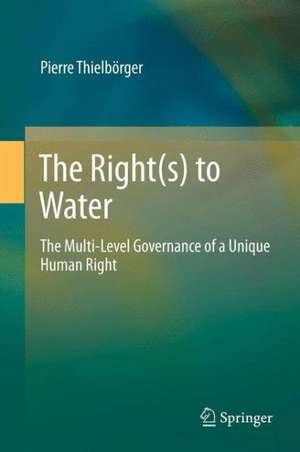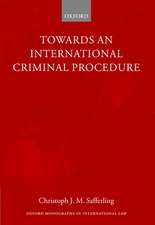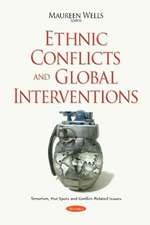The Right(s) to Water: The Multi-Level Governance of a Unique Human Right
Autor Pierre Thielbörgeren Limba Engleză Hardback – 14 oct 2013
| Toate formatele și edițiile | Preț | Express |
|---|---|---|
| Paperback (1) | 638.43 lei 43-57 zile | |
| Springer Berlin, Heidelberg – 23 aug 2016 | 638.43 lei 43-57 zile | |
| Hardback (1) | 644.63 lei 43-57 zile | |
| Springer Berlin, Heidelberg – 14 oct 2013 | 644.63 lei 43-57 zile |
Preț: 644.63 lei
Preț vechi: 758.38 lei
-15% Nou
Puncte Express: 967
Preț estimativ în valută:
123.35€ • 129.13$ • 102.06£
123.35€ • 129.13$ • 102.06£
Carte tipărită la comandă
Livrare economică 07-21 aprilie
Preluare comenzi: 021 569.72.76
Specificații
ISBN-13: 9783642339073
ISBN-10: 3642339077
Pagini: 300
Ilustrații: XVII, 236 p.
Dimensiuni: 155 x 235 x 23 mm
Greutate: 0.54 kg
Ediția:2014
Editura: Springer Berlin, Heidelberg
Colecția Springer
Locul publicării:Berlin, Heidelberg, Germany
ISBN-10: 3642339077
Pagini: 300
Ilustrații: XVII, 236 p.
Dimensiuni: 155 x 235 x 23 mm
Greutate: 0.54 kg
Ediția:2014
Editura: Springer Berlin, Heidelberg
Colecția Springer
Locul publicării:Berlin, Heidelberg, Germany
Public țintă
ResearchCuprins
Introduction.- The Current Legal Status of the Right to Water.- Philosophical and Conceptual Approaches to a Human Right to Water.- Implementation of the Right: Independent Monitoring, Enforcement against the Private Sector, and International Realization.- Conclusion.
Textul de pe ultima copertă
Politicians and diplomats have for many years proclaimed a human right to water as a solution to the global water crisis, most recently in the 2010 the UN General Assembly Resolution “The human right to water and sanitation”. To what extent, however, can a right to water legally and philosophically exist and what difference to international law and politics can it make? This question lies at the heart of this book. The book’s answer is to argue that a right to water exists under international law but in a more differentiated and multi-level manner than previously recognised. Rather than existing as a singular and comprehensive right, the right to water should be understood as a composite right of different layers, both deriving from separate rights to health, life and an adequate standard of living, and supported by an array of regional and national rights. The author also examines the right at a conceptual level. After disproving some of the theoretical objections to the category of socio-economic rights generally and the concept of a right to water more specifically, the manuscript develops an innovative approach towards the interplay of different rights to water among different legal orders. The book argues for an approach to human rights – including the right to water – as international minimum standards, using the right to water as a model case to demonstrate how multilevel human rights protection can function effectively. The book also addresses a crucial last question: how does one make an international right to water meaningful in practice? The manuscript identifies three crucial criteria in order to strengthen such a composite derived right in practice: independent monitoring; enforcement towards the private sector; and international realization. The author examines to what extent these criteria are currently adhered to, and suggests practical ways of how they could be better met in the future.
Caracteristici
A complete monograph devoted to the right to water A comprehensive, consistent and in-depth analysis of the legal consequences and political impact of the development and establishment of the right to water through the lens of a single author An innovative theoretical frame within which to understand the debate on the human right to water, and the relationship of human rights with national and regional rights Examines all possible philosophical and conceptual objections to the right Includes supplementary material: sn.pub/extras










